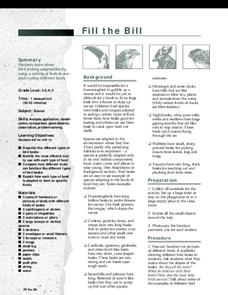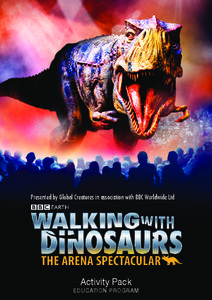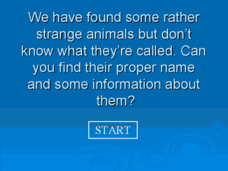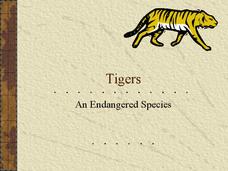National Wildlife Federation
Fill the Bill
The structure of a bird's beak lends itself to specific functions. Using an assortment of everyday objects, learners mimic the behaviors of bird beaks. They learn about the habits of different birds by studying their beaks.
National Wildlife Federation
Box Turtle Interview
Imagine life as a box turtle. Learners study the characteristics of box turtles and then assume the role in an interview. They show their understanding of how a box turtle lives by responding to a series of questions.
Alabama Wildlife Federation
Songbird Survey
Serenade your classes with a selection of bird songs. Scholars learn to identify birds by their songs with practice and then take their skills to the outdoors. They identify mating pairs while on a nature walk and repeat their walk over...
Alabama Wildlife Federation
Fill the Bill
A hummingbird isn't the only bird with a unique beak. After a discussion about the specific characteristics of bird beaks, pupils complete a station rotation and use different tools to simulate the function of different beaks. They...
Purdue University
Common Indiana Mammals
Mammals all have their own story to tell. A set of 34 cards outlines the key characteristics of different mammals. The cards include images of each mammal as well as their skulls and tracks. The back of the cards describe characteristics...
Howard Hughes Medical Institute
Lesson 5: Tracking Lion Communities
Researchers in Gorongosa National Park placed cameras there many years ago to understand what was happening with the lion communities that lived there. Little did they know, they opened a door to so much more! Inquisitive...
Howard Hughes Medical Institute
Lesson 3: Scientific Inquiry with WildCam Gorongosa
When biologists installed cameras in Gorongosa National Park, they ended up viewing a lot more than the lions they were trying to help! Young ecologists observe one of Africa's most beautiful savanna regions with interactive trail camera...
Cornell Lab of Ornithology
Amazing Birds
What's so amazing about birds? Find out just how amazing birds are with a physics of animal behavior unit created by Cornell Lab of Ornithology. Have learners explore and tap into their observational skills and notice how birds fly, what...
Agriculture in the Classroom
"Steer" Toward STEM: Careers in Animal Agriculture
Think like an engineer and an agricultural scientist over the course of 12 lessons in a STEM based unit. Young scientists take on the roles of animal physiologists, animal geneticists, agricultural engineers, animal nutritionists,...
Wildlife Conservation Society
Build Your Wild Self
Get wild with an interactive web site that challenges scholars to create their wildest self. Future wild things begin as an average person—eyes, mouth, clothes—then morph into animal attributes—horns, tails, wings—and end in the...
A to Z Teacher Stuff
Word Search Match
Go beyond a traditional word search with a clue matching, word search combo. Scholars read clues, write the word that matches, then search for the word in a puzzle. Clues and words offer insight into the life of polar bears.
BBC
Walking with Dinosaurs
Breath new life into your class's study of dinosaurs with this extensive collection of materials. Offering everything from a printable T-rex mask, word searches, and connect-the-dots activities to informational handouts, hands-on...
K12 Reader
An Interesting Animal
"Lions and tigers and bears, oh my!" Primary graders write about an animal that interests them, describing what it looks like, where it lives, and what it eats.
Twisty Noodle
Animal Facts Book
What do your pupils know about animals? Have them put together and color this little book about animals to learn about everything from camels to pandas.
Curated OER
Learning to Resist: Watercolor
Consider wax resist drawings as a way to bridge art and science. Learners view, discuss, and practice drawing insects or animals using waxy crayons. They pay attention to the creature's features as they create images with watercolor and...
Curated OER
Who Wants to be a Millionaire: Teeth
What kind of teeth do alligators have? Find out as you play a quiz game all about teeth. There are 15 questions all related to how various animals eat, swallow, and chew with their chompers.
Curated OER
Classify Animals
Give your class an idea of how animals are classified by scientists with this interactive PowerPoint activity. They are presented with six different animals, they answer yes or no questions until only one animal remains alongside...
Curated OER
Tigers: An Endangered Species
Facts about tigers are packed into a PowerPoint presentation about tigers. The presentation includes great photographs and accompanying text regarding the habitats, diet, lifespan, and physical attributes of tigers. Very interesting!
Curated OER
What Do They Eat?
What does a monkey eat? How about a squirrel? Introduce your young scholars to different types of eaters in the animal kingdom with this cut-and-paste activity. Learners assess 6 animals: a squirrel, a frog, a monkey, a seal, a dog, and...
Curated OER
Reptiles and Amphibians
Introduce your class to various reptiles and amphibians. They will meet and identify a representative from each of the four major reptile families, then learn about and discuss reptile characteristics. Next, they will identify and...
Curated OER
Animal Characteristics
Allow your students to review what they learned about animal characteristics with this PowerPoint. This slideshow includes 9 multiple choice questions and an answer key at the end. Tip: You can use this as an assessment by having your...
Curated OER
Track Traces
Students explore animal characteristics by participating in an animal anatomy activity. In this animal tracks lesson, students identify the differences between specific animals and the shape of their footprints. Students utilize a...
Curated OER
A Chicken's Life
Here is a set of comprehension questions that go with the story "A Chicken's Life." Learners answer each of nine questions by filling in the blank with the correct word then, they complete ten additional comprehension questions that...
Curated OER
Biodiversity
Short and sweet, this presentation introduces tiny scientists to biodiversity. They view pictures of three different dogs and four different spiders and compare their physical characteristics. Explorers are then sent outdoors to find...

























